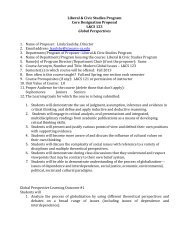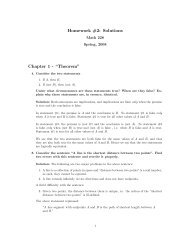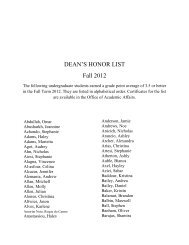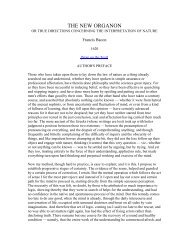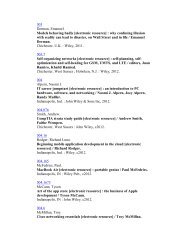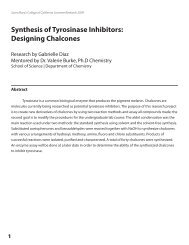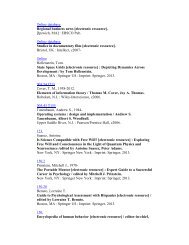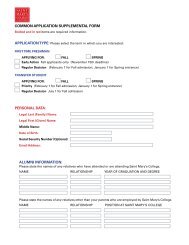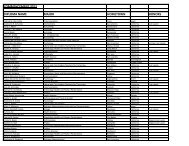Business Administration Curriculum123 Financial ManagementA study <strong>of</strong> the organization and financial administration <strong>of</strong> businessenterprise. The course includes such topics as financial analysis, value andvalue theory, risk analysis, investment decisions, corporate finance andtheory, working capital management and related topics.124 MarketingThe principles <strong>of</strong> major areas <strong>of</strong> marketing decision-making that confrontorganizations. Topics include the utilization <strong>of</strong> marketing informationsystems as well as the formulation and implementation <strong>of</strong> integratedproduct, pricing, distribution, and promotion strategies.125 Marketing <strong>of</strong> Financial ServicesA study <strong>of</strong> the principles <strong>of</strong> marketing as applied to service firms. Specialemphasis is placed on major areas <strong>of</strong> marketing decision-making that confrontfinancial services businesses. Topics covered include the utilization<strong>of</strong> marketing information systems as well as the pricing, distribution, andpromotion <strong>of</strong> services. This course may not be taken for credit if BusAd124 has been taken. This course meets the BusAd 124 requirement.126 Advanced MarketingA detailed treatment <strong>of</strong> marketing research, strategic marketing planningand the development <strong>of</strong> fully integrated marketing programs. Topicsinclude market analysis, marketing mix strategies, product positioning,market segmentation, and related social and ethical issues. This courseincludes direct application <strong>of</strong> the material in a marketing consultingproject for a business firm or nonpr<strong>of</strong>it organization. Prerequisites:BusAd 124 or 125. BusAd 126 is not <strong>of</strong>fered in the spring term.127 Business CommunicationThis course emphasizes the kinds <strong>of</strong> communication students can expectin complex organizations with multiple audiences. Grounded in competition,course material includes in-depth categorical editing, organizationalstrategies for informative and persuasive writing and speaking, constructionand presentation <strong>of</strong> arguments, and use <strong>of</strong> executive summaries.131 Organization TheoryA study <strong>of</strong> the structure, functioning, and performance <strong>of</strong> organizations,and the impact <strong>of</strong> psychological and sociological variables on the behavior<strong>of</strong> groups and individuals within them. Discussions include theories<strong>of</strong> motivation, leadership, decision-making, power and influence, groupdynamics, corporate cultures, ethics, technology, global structures, anddiversity management.132 Operations ManagementThis course studies the design, implementation and evaluation <strong>of</strong>processes in the business firm. Processes are a collection <strong>of</strong> activities thatconvert inputs into outputs <strong>of</strong> goods and services that create value forcustomers. Value is represented by factors such as lower costs togetherwith improved quality and is intended to give the firm a competitiveadvantage. Strategies are presented to solve the operational problemsassociated with creating value. Emphasis is given to factors having asignificant impact on processes, such as globalization, supply chains,technology, information and data flows, and cultural, geopolitical orenvironmental challenges.140 Strategic ManagementA capstone course which must be taken in the spring term <strong>of</strong> the senioryear, it integrates the major functional operating areas <strong>of</strong> business firmsviewed within the broader context <strong>of</strong> strategic management, i.e., theprocess <strong>of</strong> managerial decision-making and actions that determine thelong-run performance <strong>of</strong> business organizations. Prerequisites: BusAd 120,123, 124, 131, 132 and 181 (or 182). This course may not be taken forcredit if BusAd 100 is taken. BusAd 140 is not <strong>of</strong>fered in the fall term.142 Strategic Marketing ManagementA capstone course, principally for the marketing concentration, that mustbe taken in the spring term <strong>of</strong> the senior year. The course integratesall aspects <strong>of</strong> the process <strong>of</strong> strategic marketing planning, inclusive <strong>of</strong>utilizing data collected from marketing information systems and marketingresearch to inform an organization’s strategic marketing plan. Thecourse examines each component <strong>of</strong> a strategic marketing plan, includingtargeting, positioning, pricing and promotional strategies. Topics alsoinclude the integration <strong>of</strong> the firm’s strategic marketing plan with theorganization’s overall mission and strategic plan. Prerequisites: Completion<strong>of</strong> the concentration’s two interdisciplinary electives as well as: BusAd181 (or 182), 123, 124 (or 125), 126, 132, and 180. This course maynot be taken for credit if BusAd 100 or BusAd 140 is taken. BusAd 142will not be <strong>of</strong>fered in the fall term.175 Management Information SystemsAn overview <strong>of</strong> business applications <strong>of</strong> information technology. Hownetworked computers, data, technical specialists, and managers combineto form an information system. The role <strong>of</strong> information systems inmarketing, finance, production, and other areas. Ways to create and useinformation systems.180 International BusinessThe special opportunities and risks firms face as a result <strong>of</strong> the rapidglobalization <strong>of</strong> business. The economic, cultural, and institutional factorsthat must be considered; the marketing, financial, managerial, andstrategic considerations that lead to success.181 Ethical, Social, and Political Issues in BusinessThis course examines the social, political, and ethical contexts <strong>of</strong> businessstructures and practices. Students gain greater awareness <strong>of</strong> social andpublic policy issues affecting the firm and learn to use moral reasoning tomake business decisions that are both economically and ethically sound.182 Business, Economics, and Catholic Social EthicsAn alternative version <strong>of</strong> BusAd 181. Covers the same subject matter,but adds Catholic social thought to the framework studied.195 InternshipWork-study program conducted in an appropriate internship positionunder the supervision <strong>of</strong> a faculty member. Normally open to junior andsenior students only. Permission <strong>of</strong> instructor and departmentchair required.197 Special StudyAn independent study or research course for students whose needsare not met by the regular courses in the curriculum. Permission <strong>of</strong> theinstructor and department chair required.199 Special Study — HonorsAn independent study or research course for upper-division majors witha B average in business administration. Permission <strong>of</strong> the instructor anddepartment chair required.71
Curriculum ChemistryChemistryThe Chemistry Department seeks to <strong>of</strong>fer a versatile academic program that will prepare students for a variety <strong>of</strong> optionsupon graduation: employment in industry, graduate work in chemistry or related fields, entry into pr<strong>of</strong>essional schoolssuch as medicine or dentistry, or teaching at the K–12 level. Using a balance <strong>of</strong> theoretical and experimental work,the curriculum attempts to provide students with a solid understanding <strong>of</strong> fundamental concepts, the ability to reasonthrough unfamiliar problems, the tools to investigate a topic in depth, and the communication skills that are needed toshare information with others.The department recognizes that since chemistry is a discipline whose primary focus is the underlying substance <strong>of</strong> theuniverse, it is important both independently and in relation to other fields <strong>of</strong> study. For these reasons the departmentstrives to connect the curriculum to other disciplines and real-world examples whenever possible, and to routinely <strong>of</strong>fercourses to meet the needs <strong>of</strong> students who are not science majors.FacultyJeffrey A. Sigman, Ph.D., Associate Pr<strong>of</strong>essor, ChairKenneth J. Brown, Ph.D., Pr<strong>of</strong>essorSteven J. Bach<strong>of</strong>er, Ph.D., Pr<strong>of</strong>essorValerie A. Burke, Ph.D., Assistant Pr<strong>of</strong>essorJoel D. Burley, Ph.D., Associate Pr<strong>of</strong>essorJohn S. Correia, Ph.D., Pr<strong>of</strong>essor, EmeritusPatricia Jackson, Ph.D., AdjunctAlexander J. Pandell, Ph.D., AdjunctMichelle L. Shulman, Ph.D., Associate Pr<strong>of</strong>essorLearning OutcomesThe learning outcomes for the Chemistry Department are organized int<strong>of</strong>ive general categories:• Tools for learning• Fundamental knowledge and conceptual understanding• Investigative skills• Communication skills• Societal Awareness and concernsAdmission RequirementsStudents planning a major in chemistry must present credits in one year<strong>of</strong> chemistry, one year <strong>of</strong> physics, and four years <strong>of</strong> mathematics, andshould have at least a B average in these subjects. Students with a goodhigh school record but lacking credit in any <strong>of</strong> these subjects shouldremove any deficiencies in summer school. Students planning a sciencemajor should be particularly alert to the language pr<strong>of</strong>iciency requirement(see Program <strong>of</strong> Study, p. 42).Major RequirementsThe student with an interest in chemistry can pursue one <strong>of</strong> two optionsin chemistry or pursue a Biochemistry major (See Biochemistry major,p. 60) which integrates material from the fields <strong>of</strong> Chemistry and Biology.The department <strong>of</strong>fers the standard chemistry major and chemistrymajor with an environmental concentration.Suggested Chemistry Major ProgramA suggested four-year program <strong>of</strong> study for a major in chemistry is availablefrom any Chemistry Department member. Note that all freshmenare required to complete two Collegiate Seminars in the first year, oneeach in the fall and spring terms. Two additional Collegiate Seminarsmust be completed before graduation, and other <strong>College</strong> requirementsare specified in the Program <strong>of</strong> Study (see p. 42).Lower DivisionThe following lower-division courses are required for the two majors inchemistry: Chemistry 8, 9 (lab), 10, 11 (lab), 89; Mathematics 27, 28.Each major has additional lower-division requirements as follows: For thestandard chemistry major, Mathematics 29 and Physics 1, 2 (lab), 3, 4(lab) must also be completed. For the chemistry major – environmentalconcentration, students must also take: Physics 1, 2 (lab), 3, 4 (lab) orPhysics 10, 20 (lab), 11, 21 (lab) and Biology 1 (with lab), 2 (with lab).The Biochemistry major has very similar requirements (See Biochemistrymajor, p. 60).Upper DivisionThe two chemistry majors include the following core <strong>of</strong> upper-divisioncourses: Chemistry 104, 106, 114, 115, 130. Each major concentrationhas additional upper-division requirements as follows:For the standard chemistry major, students must take Chemistry 108,110, 111 or 119, 118, 197 or 199.For the environmental concentration, students must take Chemistry108 or 118, 119, and any one other upper-division chemistry course.Also required are Biology 125 and either Biology 113, 146, or 152.72



